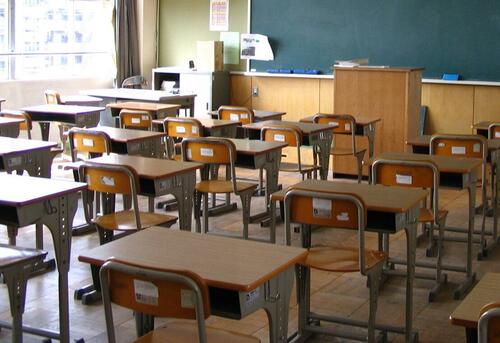Plain Jane
Just Plain Jane
Competition, The American Way | ZeroHedge
ZeroHedge - On a long enough timeline, the survival rate for everyone drops to zero
Competition, The American Way
BY TYLER DURDEN
FRIDAY, APR 26, 2024 - 10:20 PM
Authored by Jack Miller via RealClearEducation,
Our K-12 educational system is designed to serve much less than 50% of American students.

For decades the cry has been that “all kids must go to college.” Yet, only a minority do so and fewer graduate.
Our high schools have been turned into college prep schools. Shop classes have been eliminated, along with other useful courses. Most students who don’t go to college have been deprived of the education they need to be successful. And businesses looking for hungry, well-prepared personnel have been deprived of good candidates.
A 2022 report from American Compass suggests that “for every young American on the idealized path, there are ten who never enroll in college or else fail to complete a degree.” Various studies show different percentages, but all show that most students don’t complete, or even enter, college. Studies also show that fewer young people are even applying to college.
This is a real, self-imposed crisis. It also has a major impact on many of those in poorer circumstances or who get bored with college prep courses and drop out of school before graduating.
Given this well-documented reality, why has our K-12 education system not reformed itself to address this glaring problem?
Once you understand the problem, it is not difficult to figure out how to fix it. In the K-8 system, every student should be taught the basics: reading, writing, and arithmetic, plus some civics and history to start them on the road to being good citizens.
When students get to high school, they should be offered a two-track program. Keep the college prep program going for those who want to go on to postsecondary education. Also, another track should be introduced for the majority who don’t plan to go to college.
In addition to the basics such as English, history, civics, and a few others, students should have the option to take various kinds of vocation-based classes that teach the skills that are needed in the job market. We should be preparing all our young people to be good citizens, but also for good-paying jobs that don’t require a college degree.
Then, we need to strengthen our trade schools, the community college system, and internships, which would further prepare these young people to be successful in their careers. During the four to six years others are spending in college, young adults who take this track would be able to work and earn money instead of accumulating debt. In many cases they could make as much, or even more, than many college graduates.
The benefits of creating a two-track system would be immense. First, we could expand our labor pool quite a bit. Our country is facing a labor shortage. The birth rate has been down for a number of years, so fewer young people are entering the workforce, and an increasing number of people are retiring. Our immigration policies are not allowing enough skilled labor into the country.
The answer to these problems is to tap into that large, untrained, unmotivated pool of talent our schools are leaving behind. Doing so would have many benefits, both for the individuals and for the country.
For the individuals, it would provide them with a good middle-class, or higher, lifestyle. It would give them a sense of pride, of accomplishment. It would keep many of them from committing crimes and staying out of jail, and it would lead to much happier lives.
For the country, it would provide a large pool of trained workers. It would add to our gross national product. It would reduce the amount of money we spend on law enforcement and incarceration. It would prevent the enormous waste that results from theft and other crimes.
For a great many jobs, a two-year certificate from a community college or additional trade school training is all that may be needed to get a good start in a career. And, from there, meritocracy determines the rest.
This project should be taken on by the states. Education is a state responsibility and should not wait for the federal government to shoulder this responsibility. The fastest, most efficient method is for the states to act now.
Of course, those states that do act would be creating the best-trained workforces and would be growing their economies and attracting businesses. A little competition, the American way, is always a good thing.

